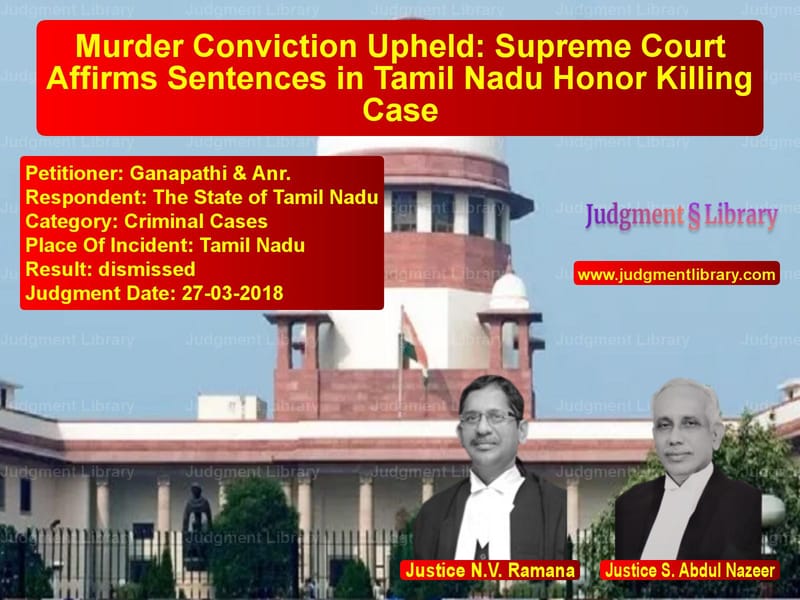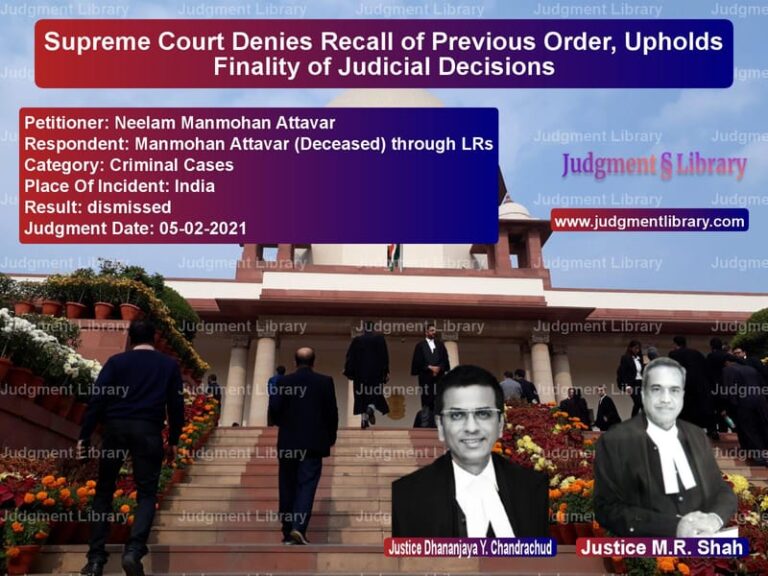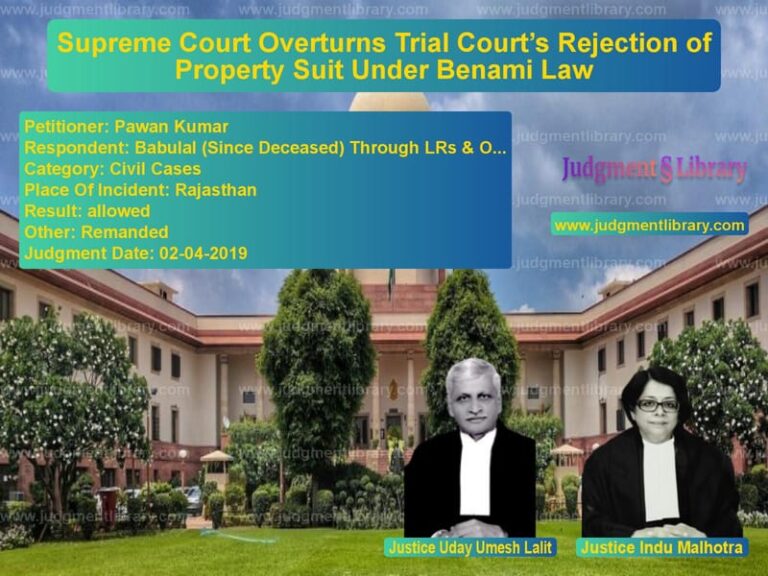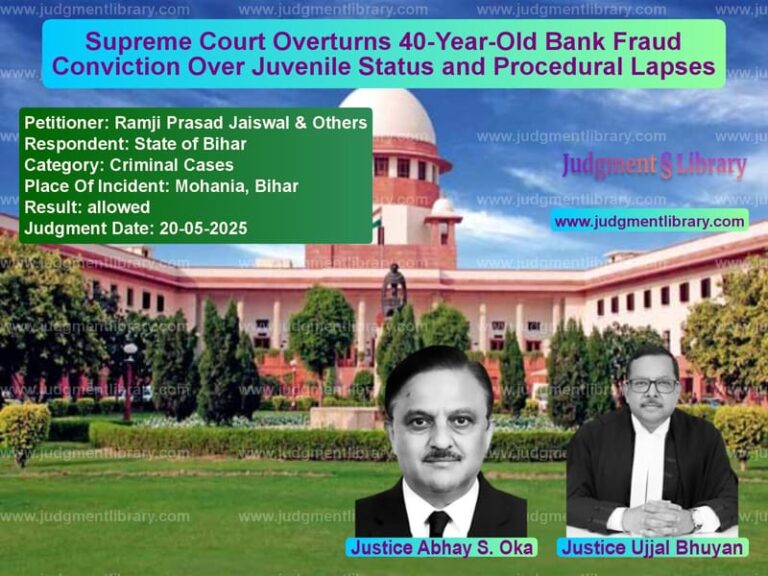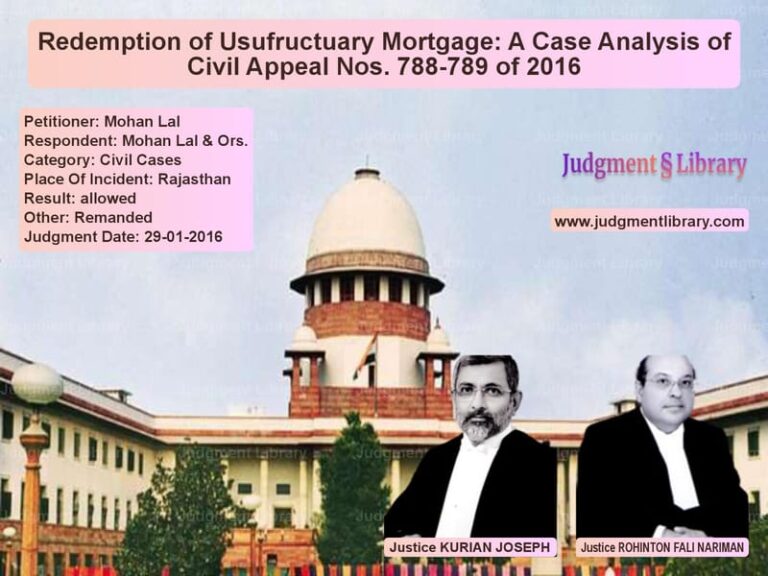Murder Conviction Upheld: Supreme Court Affirms Sentences in Tamil Nadu Honor Killing Case
The Supreme Court of India, in the case of Ganapathi & Anr. v. The State of Tamil Nadu, upheld the conviction and life imprisonment sentences of three accused in an honor killing case. The case revolved around a brutal double murder arising from a dispute between families following a forced marriage. The Court carefully examined the evidence, including witness testimonies, forensic reports, and circumstantial evidence, before confirming the guilt of the accused.
Background of the Case
The case originated in Tamil Nadu, where Muthulakshmi (Accused No. 4) was in a love affair with Murugan. When Murugan refused to marry her, a complaint was filed, leading to their forced marriage on February 5, 1999. However, their marriage was tumultuous, with frequent quarrels between the families. Eventually, Muthulakshmi left her matrimonial home and returned to her parents.
On August 4, 1999, Murugan was brutally murdered by Muthulakshmi’s relatives near a roadside eatery. Later the same day, Murugan’s sister, Poomari, was also killed near a well where she had gone to wash clothes. The prosecution alleged that the murders were premeditated acts of revenge.
Key Events
- August 4, 1999: Murugan was stabbed and hacked to death by Accused No. 2 (Ganapathi) and Accused No. 3 (Chitravelu).
- The same day, Poomari was attacked near a well, where Accused No. 4 (Muthulakshmi) inflicted injuries using a sickle.
- The crimes were witnessed by family members of the victims and bystanders.
- The police registered an FIR based on the complaint of Armugam (PW1), father of Murugan and Poomari.
Legal Issues Before the Supreme Court
The Supreme Court was tasked with examining the following issues:
- Whether the evidence presented by prosecution witnesses, mainly family members, was reliable.
- Whether the non-examination of independent witnesses weakened the prosecution’s case.
- Whether the defense’s claim that PW3 (a child witness) was not present at the crime scene was valid.
Arguments of the Parties
Petitioner’s (Accused) Arguments
- The prosecution witnesses (PW1 and PW2) were family members of the deceased and thus biased.
- The crime against Murugan took place in a public place, yet no independent witnesses corroborated the prosecution’s version.
- PW3, the daughter of the deceased Poomari, was falsely presented as an eyewitness despite school records (Ext. D1) indicating she was in school at the time.
Respondent’s (State of Tamil Nadu) Arguments
- The testimonies of PW1 and PW2 were reliable as they were natural witnesses and had no reason to falsely implicate the accused.
- PW3’s testimony regarding her mother’s murder was consistent with forensic evidence.
- The defense’s claim that PW3 was in school was unreliable since school attendance records had inconsistencies.
Supreme Court’s Analysis and Judgment
The Supreme Court, comprising Justice N.V. Ramana and Justice S. Abdul Nazeer, analyzed the evidence meticulously before delivering its ruling.
1. Reliability of Family Members as Witnesses
The Court rejected the defense’s argument that family members cannot be credible witnesses. The judgment stated:
“‘Related’ is not equivalent to ‘interested.’ A witness may be called ‘interested’ only when he or she derives some benefit from the result of a litigation. A natural witness, who is the only possible eyewitness, cannot be said to be ‘interested.’”
The Court relied on previous judgments that upheld the credibility of family members as witnesses when independent witnesses were unavailable.
2. Child Witness’s Testimony
PW3, the daughter of the deceased Poomari, provided an eyewitness account of her mother’s murder. The defense claimed she was in school at the time, based on attendance records (Ext. D1). However, the Supreme Court found that the school register had irregularities, as all students were marked present for seven consecutive months without any absentees. The Court ruled:
“The evidence of PW3 is consistent and credible. The defense’s reliance on school records is untrustworthy due to blanket marking of attendance.”
3. Medical and Forensic Evidence
The postmortem reports corroborated the eyewitness testimonies. Dr. Danraj (PW12) conducted the postmortem on Murugan and found ten cut injuries, with several being fatal. Similarly, Poomari’s autopsy revealed multiple stab wounds.
The Court concluded:
“The medical evidence matches the prosecution’s narrative of the attack, confirming the use of a sickle and knife.”
4. Conviction of the Accused
The Supreme Court upheld the conviction and sentences as follows:
- Accused No. 1 (Ponnu) was acquitted by the High Court.
- Accused No. 2 (Ganapathi) and Accused No. 3 (Chitravelu) were sentenced to life imprisonment for the murders of Murugan and Poomari.
- Accused No. 4 (Muthulakshmi) was sentenced to life imprisonment for her role in the murder of Poomari.
Final Judgment
The Supreme Court dismissed the appeals and confirmed the High Court’s ruling. It concluded:
“For all the foregoing reasons, we are of the considered opinion that there is no error in appreciation of evidence or any error of law in the judgment passed by the High Court. Therefore, we are not inclined to interfere with the impugned judgment.”
Impact of the Judgment
The Supreme Court’s decision is a landmark ruling in cases of honor killings and domestic disputes leading to violence. Key takeaways include:
- Credibility of Family Witnesses: The Court reinforced that family members can be reliable witnesses.
- Protection of Child Witnesses: The Court validated the testimony of a minor witness despite defense objections.
- Rejection of False Defense Evidence: The Court scrutinized school records and found them unreliable.
Conclusion
The Supreme Court’s verdict in Ganapathi & Anr. v. The State of Tamil Nadu ensures justice for victims of honor killings. By upholding the life sentences, the Court reaffirmed its commitment to holding perpetrators of family-based violence accountable.
Petitioner Name: Ganapathi & Anr.Respondent Name: The State of Tamil NaduJudgment By: Justice N.V. Ramana, Justice S. Abdul NazeerPlace Of Incident: Tamil NaduJudgment Date: 27-03-2018
Don’t miss out on the full details! Download the complete judgment in PDF format below and gain valuable insights instantly!
Download Judgment: Ganapathi & Anr. vs The State of Tamil N Supreme Court of India Judgment Dated 27-03-2018.pdf
Direct Downlaod Judgment: Direct downlaod this Judgment
See all petitions in Murder Cases
See all petitions in Attempt to Murder Cases
See all petitions in Bail and Anticipatory Bail
See all petitions in Judgment by N.V. Ramana
See all petitions in Judgment by S. Abdul Nazeer
See all petitions in dismissed
See all petitions in supreme court of India judgments March 2018
See all petitions in 2018 judgments
See all posts in Criminal Cases Category
See all allowed petitions in Criminal Cases Category
See all Dismissed petitions in Criminal Cases Category
See all partially allowed petitions in Criminal Cases Category

